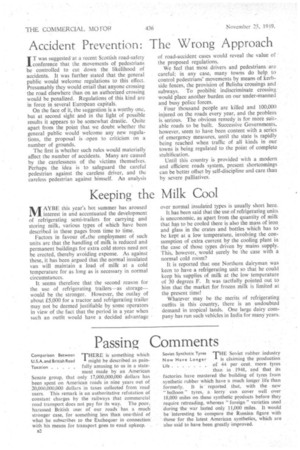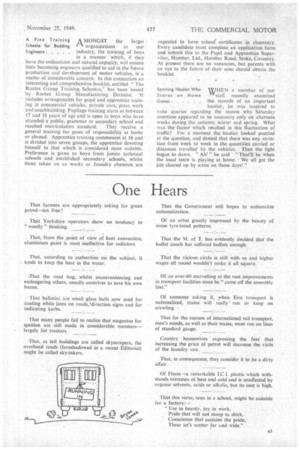Passing Comments
Page 28

Page 29

If you've noticed an error in this article please click here to report it so we can fix it.
Comparison Between 'THERE is something which U.S.A. and British Road I might be described as pain Taxation fully amusing to us in a state ment made by an American Senate group, that only 17,000,000,000 dollars has been spent on American roads in nine years out of 20,000,000,000 dollars in taxes collected from road users. This remark is an authoritative refutation of constant charges by the railways that commercial road transport does not pay for its way. The poor, harassedBritish user of our roads has a much stronger case, for something less than one-third of what he subscribes to the Exchequer in connectionwith his means for transport goes to road upkeep. . Soviet Synthetic Tyres THE Soviet rubber industry Now Have Longer I is claiming the production Life of 44 per cent. more tyres than in 1948, and that its factories have mastered the building of tyres from synthetic rubber which have a much longer life than formerly. It is reported that, with the new "balloon" tyres, a lorry can cover well over 18,000 miles on these synthetic products before they require retreading, whereas " foreign " varieties used during the war lasted only 11,000 miles. It would be interesting to compare the Russian figure with those for the latest American synthetics, which are also said to have been greatly improved. AMONGST the larger AMONGST
in our industry, the training of boys in a manner which, if they have the enthusiasm and natural capacity, will ensure their becoming. engineers qualified to aid in the future production and .development of motor vehicles, is a matter of considerable concern. In this connection an interesting and comprehensive booklet, entitled "The Rootes Group Training Schemes," has been issued by Rootes Group Manufacturing . Division. 'It includes arrangements for pupil and apprentice training in commercial vehicles, private cars, press work and coachbuilding. Pupilage training starts at between 17 and 18 years of age and is open to boys who have attended a public, grammar or secondary school and reached matriculation standard. They receive a general training for posts of responsibility at hone or abroad. Apprentice training commences at 16 and is divided into seven groups, the apprentice devoting himself to that which is considered most suitable. Preference is given to boys from junior technical schools and established secondary schools, whilst those taken on as works or foundry chemists are Engineers
expected to have school certificates in chemistry. Every candidate must complete an application, form and submit this to the Pupil and Apprentice Supervisor, Humber, Ltd., liumber Road, Stoke, Coventry. At present there are no vacancies, but parents with an -eye to the future of their sons should obtain _the booklet.
Sporting Haulier Who WHEN a member of our Scores on Home "-staff recently examined Games the records of an important haulier, he was inspired to raise queries regarding the reason why Saturday overtime appeared to be necessary only on alternate weeks during the autumn, winter and spring. What was the factor which resulted in this fluctuation of traffic? For a moment the haulier looked puzzled at the question, and denied that there was any variation from week to week in the quantities carried or distances travelled bY the vehicles. Then the light began to dawn. " Ah! he said "That'll be when the local team is playing at home. • We all get. the job cleared up by noon on those days! "




















































































